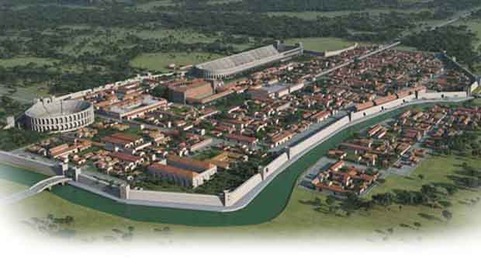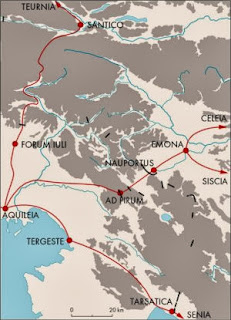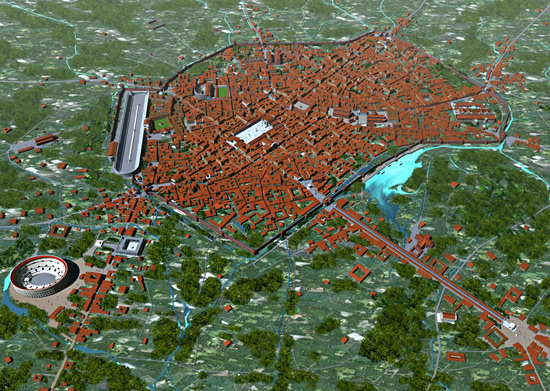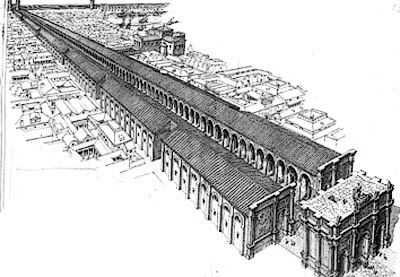Chapter X: Beginning of a new campaign
Chapter X
By the end of 482 Nepos and his court were residing in Verona the most important city in the venetian province. But he was not the only one who moved there in the recent months: military contingents from the Italian army and the Dalmatian one were now gathering in the city following the emperor’s order. Among them there were 3000 men from the Dalmatian army, 4000 men from the Italian army in addition to the elite units such as the Scholae and the Domestici. Almost 11000 men were now ready for the new spring and the incoming campaign: the Danubian campaign. For decades the local inhabitants of Raetia and Noricum had been left alone to face the barbarian attacks, while the empire was struggling for the survival. For too long the emperor had ignored his duty to protect the citizens of his empire. Now that Italy was finally liberated and returned to imperial rule, it was time to restore effective control over these provinces, only nominally under the control of Rome. Despite the lack in these provinces of any authority and the dissolution of the local garrisons, the roman inhabitants were able to organize a resistance around their most important cities, sometimes under the coordination of local bishops or former soldiers. But their determination to preserve the roman civilization in this remote region of the empire was not enough against their numerous foes: among them the Alemanni, the Herulii and the Rugii. Differently from other populations (such as the burgundians and the visigoths) there people didn’t establish a proper romano-barbarian kingdom, instead they were more similar to the germanic tribes of earlier times, interested in loot, hostage and anything that could provide them a quick and easy profit. Slowly, however, there tribes were destroying what was left of the roman rule in these provinces, sacking cities, deporting inhabitants and damaging vital infrastructures.

After almost 3 years from his previous expedition, Nepos finally feel ready enough to face another military campaign. There were many reasons that prompted him to arrange a new expedition: the need to further increase his prestige, thus strengthening his rule, the need to protect Italy from external threats and to increase the resources available to him thanks in particular to the rich presence of gold mines and steel of a fine quality. Resources which could be used by the emperor to further increase the army and to improve the equipment of his soldiers. The preparations for the Danubian campaign were not the only reasons for Nepos presence in northern Italy, an other reason was the reorganization of the border defense in Italy itself, in particular against eastern invasions. Since the death of Theodosius, Italy had been left without a proper defense against armies marching from the Illyrian region, while the destruction of Aquileia removed the last obstacle to foreign invasions. Therefore Julius Nepos proceeded with the reinforcement of the eastern sector of the Alpine region: where once stood the city of Aquileia, he ordered the foundation of a new walled city, while sending there 7000 citizens coming from other cities of "Venetia and Histria", called “Aquileia Nepotiana” but commonly know again as Aquileia. To stimulate the growth of the city, he provided the inhabitants with a small Circus and Baths while moving there the seat of the Consulares of the Venetian province (his presence and that of his staff would stimulate the economic and political activities inside the city).

Aquileia, before its destruction, near Natisone river.
Meanwhile he also proceeded with the fortification of the road that linked Italy with the eastern provinces: the Castra Alpium Iuliarum. Destroyed during the civil wars of the previous century, Nepos saw these fortifications as vital for the protection of his empire. He himself once considered to invade Italy using this road. While he would be busy with the northern campaign he appointed a new officer, the Dux Venetia et Histria, to supervise the fortifications while training a contingent among the locals, responsible for the defense of these forts. The only officer with the rank of “dux” inside the Italian peninsula, he was subjected to the Magister Militum Praesentalis and would lead the defense of eastern Italy from the city of Aquileia.

The Castra Alpium Iuliarum
By the end of 482 Nepos and his court were residing in Verona the most important city in the venetian province. But he was not the only one who moved there in the recent months: military contingents from the Italian army and the Dalmatian one were now gathering in the city following the emperor’s order. Among them there were 3000 men from the Dalmatian army, 4000 men from the Italian army in addition to the elite units such as the Scholae and the Domestici. Almost 11000 men were now ready for the new spring and the incoming campaign: the Danubian campaign. For decades the local inhabitants of Raetia and Noricum had been left alone to face the barbarian attacks, while the empire was struggling for the survival. For too long the emperor had ignored his duty to protect the citizens of his empire. Now that Italy was finally liberated and returned to imperial rule, it was time to restore effective control over these provinces, only nominally under the control of Rome. Despite the lack in these provinces of any authority and the dissolution of the local garrisons, the roman inhabitants were able to organize a resistance around their most important cities, sometimes under the coordination of local bishops or former soldiers. But their determination to preserve the roman civilization in this remote region of the empire was not enough against their numerous foes: among them the Alemanni, the Herulii and the Rugii. Differently from other populations (such as the burgundians and the visigoths) there people didn’t establish a proper romano-barbarian kingdom, instead they were more similar to the germanic tribes of earlier times, interested in loot, hostage and anything that could provide them a quick and easy profit. Slowly, however, there tribes were destroying what was left of the roman rule in these provinces, sacking cities, deporting inhabitants and damaging vital infrastructures.

After almost 3 years from his previous expedition, Nepos finally feel ready enough to face another military campaign. There were many reasons that prompted him to arrange a new expedition: the need to further increase his prestige, thus strengthening his rule, the need to protect Italy from external threats and to increase the resources available to him thanks in particular to the rich presence of gold mines and steel of a fine quality. Resources which could be used by the emperor to further increase the army and to improve the equipment of his soldiers. The preparations for the Danubian campaign were not the only reasons for Nepos presence in northern Italy, an other reason was the reorganization of the border defense in Italy itself, in particular against eastern invasions. Since the death of Theodosius, Italy had been left without a proper defense against armies marching from the Illyrian region, while the destruction of Aquileia removed the last obstacle to foreign invasions. Therefore Julius Nepos proceeded with the reinforcement of the eastern sector of the Alpine region: where once stood the city of Aquileia, he ordered the foundation of a new walled city, while sending there 7000 citizens coming from other cities of "Venetia and Histria", called “Aquileia Nepotiana” but commonly know again as Aquileia. To stimulate the growth of the city, he provided the inhabitants with a small Circus and Baths while moving there the seat of the Consulares of the Venetian province (his presence and that of his staff would stimulate the economic and political activities inside the city).

Aquileia, before its destruction, near Natisone river.

The Castra Alpium Iuliarum
Last edited:

